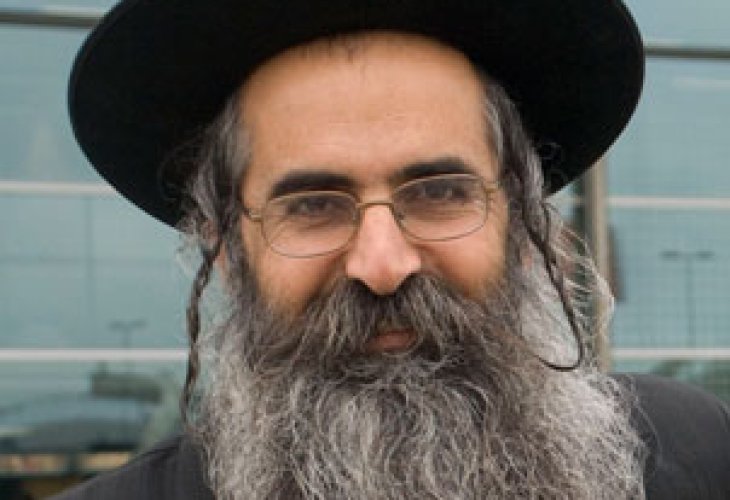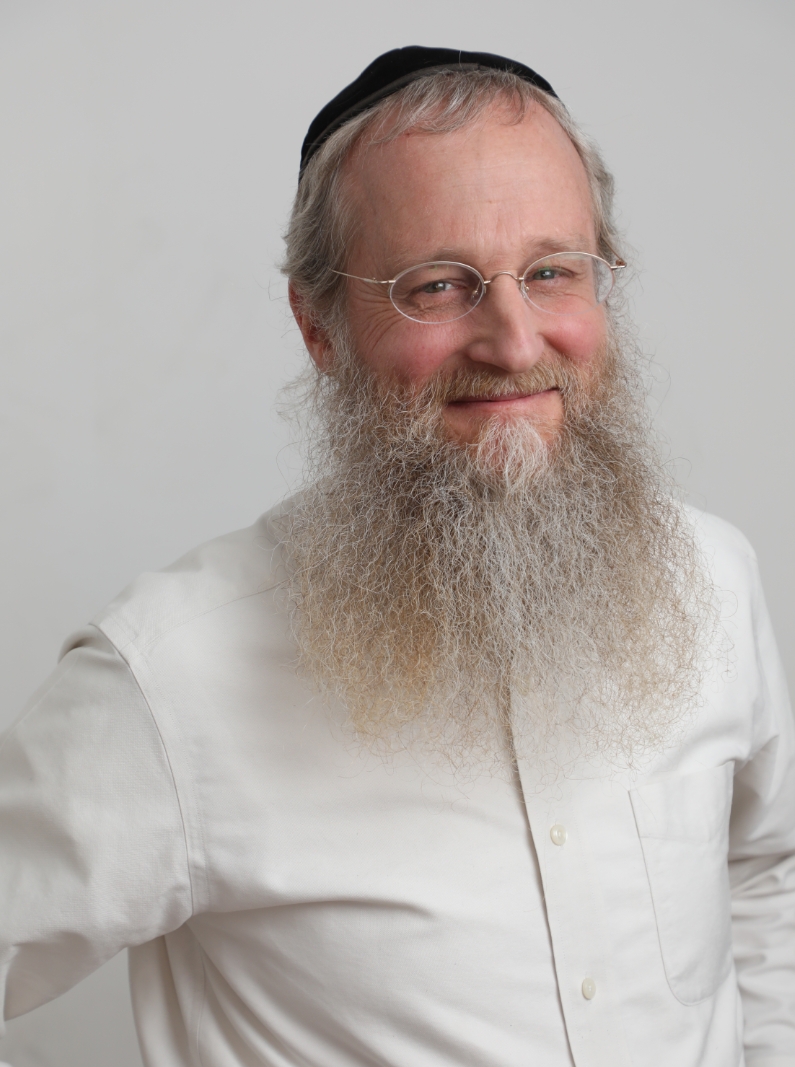"Tzvi Yehezkeli Touched the Heavens": Exclusive Interview with Rabbi Daniel Cohen
Following the audience's love for the enchanting show "Ahavat Olam" aired on the Hidabroot channel, Rabbi Daniel Cohen, who appears alongside Tzvi Yehezkeli, shares about its creation, why he returned to music after a 15-year hiatus, and the anti-Semitic attacks he endured as a teenager in the U.S.
 Rabbi Daniel Cohen (Photo: Hidabroot)
Rabbi Daniel Cohen (Photo: Hidabroot)Rabbi Daniel Cohen, 61, married and a father of seven, is the rabbi of the Bat Ayin settlement where he resides, a halachic authority, an artist, and a leader of personal and spiritual growth groups according to Judaism. Recently, Rabbi Cohen, together with Tzvi Yehezkeli, began broadcasting the "Ahavat Olam" program on Hidabroot. The show, touching on the delicate strings of the human soul, has been very well-received by the audience.
"I was born in the United States," says Rabbi Cohen, "and for several years, while living in Florida, we were the only family observing Shabbat within a radius of more than 30 kilometers.
"We observed Shabbat and kashrut at home, and the house was very strong in its Jewish identity. This was of utmost importance to my parents. For example, we would study Torah together on Shabbat, and this influenced me greatly.
Music holds a significant place in Rabbi Cohen's life. "I encountered music at a very young age. I started playing at age 8, and in the non-Jewish high school I attended, I specialized in playing. I played a lot of classical music and jazz there, mainly on the clarinet and saxophone. Although I was in a good place socially, I experienced a fair amount of anti-Semitism from the non-Jewish students in the class. Several times I was even physically attacked for no reason.
One example of anti-Semitism is vividly remembered by Rabbi Cohen. "On the bus I used to take daily to school, there was an unofficial seating division between blacks and whites. Naturally, given my skin color, I sat with the whites. At one stop, a non-Jewish fellow would regularly board and, usually not knowing I was Jewish, sit next to me. "After a whole year, during which he sat next to me almost every day, I received a gift from my grandmother: a watch with Hebrew letters. I wore it, and the next day my bus companion asked if it was Chinese written on the watch. I told him it was Hebrew. He immediately asked if I was Jewish, and I answered yes. From that moment on, he stopped sitting next to me, and I moved to sit with the blacks".
How does the endless longing for a true connection with Hashem manifest? Tzvi Yehezkeli meets with Rabbi Daniel Cohen on the "Ahavat Olam" program for a powerful conversation about the meaning of prayer, accompanied by musical and vocal performances. Watch:
It Was Clear to Me: I Will Live the Rest of My Life Only in Israel
After finishing high school, Rabbi Cohen traveled to Israel, a land he longed for since childhood. "After high school, a group of friends I knew organized a trip, and together we moved to Israel. We lived in the secular kibbutz Ein Harod, but they ensured we had a kosher kitchen. I wanted to move to Israel to strengthen my Jewish identity, and the Hebrew language is very important to me, so I took this challenging step.
"In the kibbutz, I worked various jobs, but I also dedicated a lot of time to study. After six months, I returned to the U.S. and began studying at Columbia University in New York, pursuing a Bachelor's degree in comparative religion. During that period, I was searching and forming my identity and opinions.
"After completing the degree, I returned to Israel, intending to study for a year in a yeshiva in Jerusalem. After a short time in Israel, I understood that I very much loved the Torah and loved Israel, and it was clear to me that I would live my life in Israel. After a year, I left the yeshiva, moved into a rented apartment in the Bucharim neighborhood, and mainly studied with partners.
"Subsequently, I began studying under Rabbi Yisroel Zev Gustman. Rabbi Gustman was one of the survivors of Vilna, truly one of the geniuses there. Additionally, he served as a dayyan in the Vilna Beit Din, and during the Holocaust, he even fought with the partisans against the Nazis, may their name be erased. I studied in his yeshiva for six years, and during this time, I got married.
"The years in Rabbi Gustman's yeshiva were very significant for me. During these years, I got to know the Tanya, the Jewish introspection and meditation paths, and I also played a lot of music. Playing at weddings was our main source of income during these years. Beyond that, in those years, we also joined the group that established Bat Ayin. We moved here by foot. There was nothing here.
"After two years in the settlement, I was appointed as its rabbi. Today, with Hashem's help, I give lessons, rule on halacha, teach deep Torah on the weekly portion, daily page, and for ten years I served as the head of a yeshiva for returnees to Judaism in the settlement. Apropos Bat Ayin, here I also met Amit Yitzhak, one of the leading guitarists in the country, who played with us on our program in Hidabroot, and he also accompanies me in appearances I will share about later.
"Amit is a returnee to Judaism, and when he and his family wanted to move into the community, they came to me for an introductory conversation, as acceptance into Bat Ayin involves a conversation with me. So, we met for the first time. As soon as Amit entered the room, I immediately heard tunes in my head, and I told him right away that I wanted to bring music back into my life.
"For many years, I was in denial of my musical side," Rabbi Cohen notes. "Although I started playing at age 8, and music has always been an important part of my life—when I was appointed as the rabbi of Bat Ayin, I stopped playing. It didn't seem fitting to me. I was mainly focused on halachic rulings and spiritual guidance.
 Rabbi Daniel Cohen (Photo: Eugene Weisberg)
Rabbi Daniel Cohen (Photo: Eugene Weisberg)"But when Amit came, the musical soul awoke. We immediately connected and began performing together. Our performances, which have been ongoing for seven years, are a combination of serving Hashem, opening the heart, Hasidic tunes, quality original music, all of which together form a spiritual journey of soul elevation.
"Every motzei Shabbat mevorchim, we perform in Bat Ayin, and once a month in Jerusalem. I also integrate this music into the workshops I conduct, and with Hashem's help, amazing things happen in them. For example, last week, in one of the groups I lead, we worked on forgiveness in areas where there is great anger and strong resentment.
"One group member worked on the complex relationship he has with his brother. This week, he told us how, surprisingly, after many years, his brother invited him to his home. During their conversation, his brother apologized for several things he did to hurt him. Rabbi Cohen marvels that the work done in the workshops is personal, but it also has a strong spiritual impact. The context is psychological, but the broader connection is the presence of the divine presence in the world by fixing things in our lives. Many people feel that in the workshops, they undergo a process of 'rebirth'.
The work in the workshops is done in groups. "Because that's where the impact is strongest," explains Rabbi Cohen. "With the right content, suitable music, and opening of the heart, you can reach unbelievable things".
How to love and feel loved in my relationship with my spouse? What can be done to stay vigilant and revive love? How does the love of Hashem reflect in my marriage? Tzvi Yehezkeli meets with Rabbi Daniel Cohen for a personal, touching conversation about the meaning of love, accompanied by musical and vocal performances. Watch:
When Tzvi Yehezkeli Touched the Heavens
"The truth is, with Hashem's help, the program we had the merit to create for the Hidabroot channel is very beautiful in our eyes," says Rabbi Cohen about his joint show with Tzvi Yehezkeli, 'Ahavat Olam'. "Even so, we were surprised by the many positive reactions we received. The program is the result of many years of developing spiritual insights, combined with spiritual work that creates an experience of closeness to God and love for others.
And indeed, Rabbi Cohen has substantial backing for his words. Rabbi Cohen brought with him 30 years of study, teaching, and rabbinical leadership, including 20 years working with individuals and groups, Jewish meditation, psychological counseling, and group dynamics. "Over the years," adds the rabbi, "I realized it's not enough just to tell people statements in this field, and there is a need to develop tools and means through which people can internalize and embed these concepts.
"In addition, the program has a real friends' conversation, which greatly helps in conveying its messages. Tzvi and I love each other very much, and it is felt strongly. Tzvi brings precision, life wisdom, spiritual depth, and of course, his communication ability is very present in the experience, and thanks to that, he managed to draw out good things from me. And, of course, bring out good things from himself, too.
"Tzvi and his family moved to Bat Ayin a few years ago as part of his process of returning to Judaism. We chatted here and there, but nothing more. After some time, he started attending the 'daily page' class I give in the mornings, and we began to know each other better. I felt he was receiving the type of Torah I bring, and I connected with what he had to offer. In my Talmud classes, I strive to uncover what lies beneath the plain meaning, and Tzvi connected with that.
"Thus, our connection deepened, and one day a young rabbi named Segev Cohen, from the Jewish film school of the Torah of Life Yeshiva, approached me and suggested that Tzvi and I make a program together for Hidabroot. We thought about it a bit and decided, with Hashem's help, to go for it. We believed we had much to offer.
"The truth is, we worked hard on the program. Experiments, simulations, planning, examining what works and what doesn't, etc. To our delight, Hidabroot brought in a very talented director, Revital Balali Zimmering, a team of about 12 people was formed, 3-4 cameras, sound crew, lighting, and we set out on our way.
"There were many good things in the program, and still, with Hashem's help, there will be many good things because of it, but one of the moments I won't forget was when we played the tune 'Kol Dodi Dofek'. I was deeply moved by the moment when I saw how Tzvi took this tune to the highest places within him.
"When we played this tune, I observed how these moments touched everyone there very deeply, and for several moments we all felt like we were in another dimension. We touched the deepest longing humans have, and that is the longing for love. Pure, genuine, and complete love".
Why can't I stop my anger? How do you deal with the poisonous emotion that bubbles inside us and threatens to destroy the home? Tzvi Yehezkeli meets with Rabbi Daniel Cohen for a fascinating conversation about the attribute of anger, accompanied by musical and vocal performances. Watch:
The enchanting joint program of Rabbi Daniel Cohen and Tzvi Yehezkeli "Ahavat Olam" is broadcast on the Hidabroot channel on Wednesday at 21:00, and again on Saturday night at 23:00. The program will also be available on the website's VOD page.

